
Spirulina has long been celebrated as one of the world’s most powerful superfoods — rich in essential nutrients and widely promoted for its health-boosting properties. But is Spirulina really as beneficial as it’s often claimed? In this article, we’ll take a closer look at the science-backed benefits of Spirulina, potential side effects, and the best ways to use it effectively for better health.
Before exploring Spirulina’s benefits, let’s start with the basics. Spirulina is a type of blue-green microalgae with a natural spiral shape, found in both freshwater and saltwater environments. It is one of the oldest life forms on Earth and was used as a nutrient source as early as the Aztec civilization.
Spirulina is packed with complete protein, vitamins, minerals, and antioxidants — earning it a place among the most nutrient-dense foods on the planet. Because of its exceptional nutritional profile, Spirulina is now cultivated and consumed globally in powder or tablet form as a natural dietary supplement.

Spirulina has gained global recognition not just for its nutritional richness, but also for the wide range of health benefits supported by modern research. Below are the main reasons why Spirulina is considered a true superfood:
One of the greatest advantages of Spirulina lies in its exceptionally rich nutrient composition. A single tablet of TA Vital Spirulina contains about 325 mg of pure Spirulina extract, delivering a powerhouse of nutrients even in small doses.
Spirulina provides:
Just a small daily intake can help nourish the body, support cell regeneration, and strengthen overall vitality.
Spirulina is rich in Phycocyanin, a natural antioxidant known to combat free radicals and protect cells from oxidative stress. This compound enhances the body’s immune response and supports the production of white blood cells, which help fight bacteria and viruses.
Research suggests that regular Spirulina supplementation can boost immune resilience, helping the body defend against common illnesses and chronic inflammation.
Oxidative stress and inflammation are major contributors to aging and many chronic diseases. The antioxidants in Spirulina — especially Phycocyanin, beta-carotene, and vitamin E — help neutralize free radicals, protecting the body from cell damage.
These properties make Spirulina beneficial for reducing inflammation-related conditions, supporting heart health, and promoting youthful skin and overall well-being.
For those looking to lose or manage weight, Spirulina is a great natural ally. It provides energy and essential nutrients with very few calories. When taken before meals, Spirulina can help create a feeling of fullness, reducing cravings and appetite naturally.
Studies also indicate that Spirulina may improve fat metabolism, helping the body burn stored fat more efficiently. That’s why many nutritionists recommend Spirulina as part of a balanced weight-loss diet — promoting fat reduction without fatigue or nutrient deficiency.
Daily Spirulina consumption can help balance gut microbiota and improve digestive efficiency. The natural enzymes and amino acids in Spirulina support nutrient absorption and reduce digestive discomfort.
People who regularly experience issues such as bloating, constipation, or indigestion may find that Spirulina helps promote smoother digestion and better gut health.
Clinical studies have shown that Spirulina can help reduce LDL (bad cholesterol) and increase HDL (good cholesterol) levels. This balance helps protect cardiovascular health and reduce the risk of heart disease, stroke, and hypertension.
Additionally, Spirulina’s antioxidant content supports healthy blood vessel function, contributing to better blood pressure control and circulation.
Spirulina may also benefit people with type 2 diabetes or prediabetes. Some studies show that regular Spirulina intake can help lower fasting blood sugar and improve insulin sensitivity.
When incorporated into a balanced diet, Spirulina can help maintain more stable blood sugar levels — making it a valuable supplement for those seeking natural blood glucose management.

While Spirulina is generally safe and well-tolerated, it may not be suitable for everyone. Some individuals could experience mild side effects, especially when starting supplementation or consuming low-quality products.
👉 Always choose reputable, tested Spirulina products to avoid contamination with heavy metals or harmful bacteria — which can occur in poor-quality sources.
To gain the full benefits of Spirulina, it’s important to follow the correct dosage and usage instructions. Spirulina is commonly available as powder or tablets, and dosage can vary depending on individual health goals.

If you’re seeking a natural way to boost energy, strengthen immunity, or support metabolism, Spirulina can be an excellent choice. Its remarkable nutrient content and proven benefits make it one of the best superfoods available today.
However, it’s essential to remember that Spirulina is not a substitute for medical treatment. Always consult your healthcare provider before starting any supplement, especially if you have existing medical conditions or take prescription medication.
So, is Spirulina really as good as people claim?
The answer is — yes, when used correctly and responsibly.
Spirulina is a nutrient powerhouse, rich in proteins, vitamins, minerals, and antioxidants that support immunity, heart health, digestion, and weight control. Countless studies have confirmed its effectiveness as a natural supplement for maintaining and improving health.
If you’re considering adding Spirulina to your daily wellness routine, TA Vital Spirulina is a reliable option — providing high-quality Spirulina cultivated under strict safety standards.
Take it consistently, follow proper guidance, and combine it with a balanced lifestyle — and you’ll likely experience why Spirulina is truly one of nature’s most valuable gifts for human health.